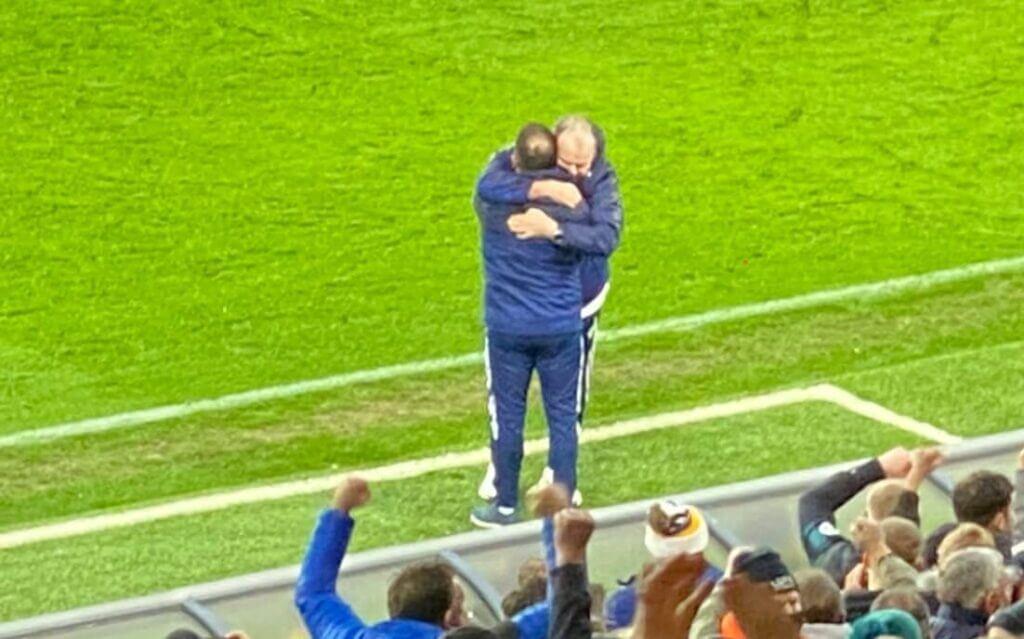Marcelo Bielsa and a hug that says it all

The ball ambled into the far corner of the net and Marcelo Bielsa fell instantly into the arms of his assistant, Pablo Quiroga. Seconds remained but the game was done and the pair of them stood there, embracing tightly for what felt like an eternity. Amid the pandemonium they were lost in time — and in each other’s orbit.
Bielsa does not go in for unsolicited celebrations and even at Swansea City, on the day when the Championship gave up on holding Leeds United against their will, he limited himself to a clench of his fists and a wipe of his nose as Pablo Hernandez cleared the way to utopia.
His staff have learned to keep their distance when goals fly in. But gentle emotion like Elland Road saw yesterday is what drips from Bielsa when the dogs are on him, when the strain builds and self-doubt develops. No length of service in football makes a coach impervious to a league table as the Premier League looked to Bielsa on New Year’s Day.
His hug with Quiroga was like their hug away to Rotherham United in 2019, at the end of a victory that brought welcome relief in the wake of Spygate. Bielsa had spent the fortnight before that win fighting fires with his integrity under attack and Quiroga’s beeline to him at full-time was a symbolic line in the sand.
Bielsa had form on his side back then, though, and the unerring confidence of everyone in Leeds. That he and Quiroga were embracing before full-time against Burnley was indicative of a year that has taken a pound of flesh and could not continue to meander as it had. The pressure was real and the release was instinctive.
“I don’t ignore the situation we’re in,” Bielsa said, plainly taking no morbid pleasure from the experience of feeling embattled. “I don’t ignore what my responsibilities are and that can’t not influence my state of mood.” Yet one result, Leeds’ 3-1 win over Burnley, felt as crucial as Bielsa made it look in the dying moments. Leeds were eight points clear of the bottom three, in a division where the bottom three look ill-equipped to make up any gap of note. It strengthened Bielsa’s hands on the steering wheel.
The finishing touch, the header which bounced inside Burnley’s far post in injury time, was supplied by Dan James and it was to Bielsa’s credit that on this afternoon, his substitutions worked: James for Jack Harrison and Joe Gelhardt for Tyler Roberts, creating more chance of cordite catching fire up front. But the moment of the game, the moment where everything turned, was left to Stuart Dallas whose goal turned a dicey fixture tied at 1-1 in the direction Bielsa needed it to go. Salvation in the 77th minute, making a good new year much easier to envisage.

Dallas’ goal was crucial – he exemplifies this Leeds team (Photo: George Wood/Getty Images)
In the list of things Massimo Cellino did well as owner of Leeds, how high is the signing of Dallas? And in the list of signings that gave no hint of what money was actually buying, whose bow at Leeds had had more strings to it than the Northern Ireland international’s?
The day when news of Dallas’ transfer broke, back in 2015, was typical of Cellino’s capacity to surprise. Leeds were committing more than £1 million to the deal and were not in the habit of spending £1 million for fun, but Dallas was slightly obscure; a player who people spoke well of but a player who was not getting much of a game at Brentford. Uwe Rosler, Leeds’ manager, had identified him as a target but it was not too long before Cellino had had enough of Rosler.
Leeds were investing in a right-winger with potential and that, it seemed, was that. Rosler reckoned Dallas might have the brain to moonlight as a No 8 but virtually no one saw Dallas the right-back, Dallas the left-back, Dallas the centre-mid or Dallas the indefatigable ace card.
It took several years for the club to appreciate him as T-1000 who could play anywhere, do anything and dig out a goal like yesterday’s velvety, 20-yard shot that made Elland Road think 2022 will see them right. Hernandez used to finish like that. Raphinha can clearly finish like that. And so, inevitably, did Dallas on his 250th club appearance. Wayne Hennessey, in the Burnley goal, stood flat-footed as the ball wafted past him.
Bielsa is reliant on bits of clever craft like that because too much of this season has comprised of Leeds knocking heavily on a door that does not look like opening. They have games that are there for the taking but too often get away from them, as shown by the fact that 15 points dropped from winning positions is not far off the combined total from all of Bielsa’s previous three years as head coach.
In their first Premier League campaign, his side generally won the games they deserved to win and lost the games they deserved to lose. This time nobody has been quite sure of who has earned what. And in the background of a mediocre points tally was the lingering risk of an all-out relegation fight.
Yesterday encapsulated the search for something closer to perfection. Before half-time, Leeds relied on an underrated skill of theirs, peppering Burnley with turnovers and in transition. The trademarks of Bielsa’s football at Leeds were established almost as soon as he walked in the door — an exceptionally high possession rate, bodies committed to the final third, a mentality which made games in the Championship the equivalent of attack versus defence — but analysis often overlooked a trait contrary to the strengths of a squad who liked to beat other teams to death. Bielsa’s team knew how to counter-attack and when they did, there was often no living with them either.
The end-to-end blitzes — Hernandez’s finish away to Huddersfield Town, Roberts whipping in a low shot in a 4-0 rout of Hull City — are, even now, some of the best goals scored under Bielsa, for whom an all-in passage of play eclipses one player doing what Raphinha almost did against Burnley by trying to lob Hennessey from the halfway line. But that Raphinha chance was the product of Leeds trusting in a tactic that produced six goals in their promotion year and, according to Opta’s stats covering fast breaks, seven in the Premier League last season.
Burnley were incapable of avoiding limp losses of possession and Leeds had begun to thrive on them before Harrison forced in the opening goal, punishing James Tarkowski’s weak pass. One-nil should have led to a wider advantage but Burnley equalised early in the second half with a deft free-kick from substitute Maxwel Cornet and Leeds were back in a scenario they know too well, asked to reassert themselves when the game had otherwise been shaping up nicely.
Bielsa’s fourth season, though, is answering the question of whether a group of players who have shown so much finesse on his watch know how to pick up a shovel and dig. Dallas found one corner of the net and James’ header found the other. Bielsa and Quiroga could not resist a cuddle.
It was hard to imagine Bielsa being driven home to a cigar and a deckchair but on Friday he described Burnley’s visit as “a great opportunity to redirect where the campaign is going” and ultimately, it might. The Premier League’s bottom three have four wins between them and the margin in Bielsa’s favour is a healthy chasm behind him. Leeds spent the lead up to Christmas looking like they were terminally stuck on darts for double top, unable to check out of the relegation picture. But a gem from Dallas, a header from James, a hug between Bielsa and Quiroga and the new year finds the spirit renewed.

 16
16 